#and has taken over what remains of the parisian rites
Note
Hello! I just discovered you recently, dived headfirst into several your fics and am so in love with them. I'm also incredibly grateful because I'm in the middle of putting a house on the market and your fics are saving my sanity. My most recent read is 'Ouverture', and I love bitter, slightly elitist and secretly disdainful Desmond. Now I have so many questions about Unity cannon (that you've cannonballed) if you wouldn't mind just head cannoning some future what if answers?
Does Arno return to France and get caught up in the revolution? Does Des come with and keep out of sight? IS Des considered a traitor by the Paris Assassins? Arno have an opinion on the Parisian Brotherhood? Does he have better Eagle vision since Des trained him? Do Paris Assassins read blue or white to him? Does he meet Elise again? What has become of the de la Serre family?
The French Revolution:
*random rooftop after absurdly flashy physics breaking move that avoided the lookout of five Paris Assassins*
Pierre: "Pisspot."
*arrogant eyebrow game at max and full permission from Des to be an asshole*
Arno: "0uncle Pierre."
Pierre. "Figured. Only one other who could hold eagle vision that easily to evade everyone with that stunt without breaking his neck. He would have kicked me as he flipped over my head."
Much love and thanks! And sorry for the long submission!
Hello! I’m so happy my fics were able to help you during such a hard time and please don't apologize. I love getting submissions and asks, no matter how long or short they are (although I am quite late in answering them TTATT). I hope selling your home is going well!
Okay, so let’s talk about the possible future of Ouverture and A New Way To Do Things in relation to Arno.
Arno will, of course, grow up in the homestead in this one. Unity officially starts 5 years after the end of AC3 when Arno is around 21 years old. Arno returns to France because he actually followed Desmond back to France (while Ratonhnhaké:ton and Clay had to stay behind for the Brotherhood and tells Desmond that they’ll catch up to him instead). Desmond returns because Lafayette requested their aid (he and Lafayette talked a lot during the American Revolutions as two French dudes doing whatever they can) and Desmond agreed to help his ‘motherland’.
This means that Desmond and Arno went back to France without the Parisian Brotherhood’s ‘approval’ so they’re going rogue (although Charlotte gets a visit and she cries because of how much Arno has grown).
Arno now calls Desmond ‘dad’ in this one too although he still calls Charles Dorian ‘father’ and they become embroiled in AC Unity’s plot as well, with Desmond having bad feelings because there’s something in Paris that just makes his skin crawl.
Desmond is sorta in a very precarious position in the Parisian Brotherhood, especially now that Sophie Trenet is a council member. A lot of the council members have a more forgiving stance on Desmond, especially after they hear how he helped Ratonhnhaké:ton take back the ‘colonies’ from the Templars but they’re not necessarily happy that he’s back. Sophie’s the one who is pushing for him to regain his old rank (not that Desmond wants it) though because she remembers him as being a good man and a great Assassin.
Desmond and Arno actually visits Bellec in prison and that’s how they reunite. Well…
That and the cannonball that ‘started’ the prison break…
Arno is officially a member of the American Brotherhood of Assassins (like Desmond) so he’s not thought of as a traitor but more like an outsider. Arno doesn’t mind though because his memory of France felt more like a distant dream. He doesn’t like to go to Versailles though.
Arno’s opinion of the Parisian Brotherhood is pretty much nonexistent. Desmond doesn’t like to talk about them, not even to complain about them. Other than say their ranking system is ridiculously long but Arno is pretty sure Desmond was being sarcastic (he was not).
Because of this, the Parisian Assassins appear as either blue (Bellec and Sophie) or white to him. They’re polite to him but also sorta cagey because he is not one of them as far as the Brotherhood is concern.
He does have a better Eagle Vision, one of the more advanced ones, actually, considering Desmond, Clay and Ratonhnhaké:ton trained him (and that means his Assassin style is a combination of his three instructors). The whole “I see their memories” thing Arno is also theorized by Clay as being a mutation caused by Arno’s close proximity to whatever Charles Dorian was carrying with him before he handed it off to another Assassin then returned to France to get his next (and last) mission. Clay believes that it’s some kind of POE and that it sorta mutated Arno’s Isu genes to be more prevalent in this case because he was still young when he was in it’s area of ‘influence’. Of course, that’s all guesswork and Arno just uses it to get more information.
Arno does meet Élise once more and it’s… well… it’s complicated.
While it’s highly possible that Arno would still hold a torch for Élise during that time, it is also highly possible that she would just be a distant memory, the kind girl whose parents may have had a hand on the death of his father (or so Desmond believed). Hell, if you want to add more drama in that front, it could be that Élise and Arno sees each other as ‘enemies’ this time around, their childhood memories being nothing more than the innocence of children that they could no longer go back to (especially with them no longer having any long history with one another so Arno sees Élise as a Templar gone rogue and Élise sees Arno as just another Assassin). (If you want to make it hurt, have Élise be the one to actually carry a torch for Arno while Arno had already fallen in love or may have already gotten married by the time he returns to Paris. To who? Ellen’s daughter Maria who becomes Arno’s childhood friend in the Davenport Homestead). Also, he’s seen as the older brother of Ratonhnhaké:ton’s children as well so, in many ways, Arno feels more at home at Davenport than he is in Paris while Élise’s father died because he couldn’t get the letter meant to warn him in time and she’s just full of anger and the burning desire for vengeance right now, with no one she can trust at all.
Also, also… Desmond has a reunion of his own to rival Arno’s Templar-connection past.
His aunt…
Madame Flavigny.
(Yeah, that’s right. The only person who knew Desmond as Antoine Faroy and his only living blood relative is a Templar, to be more exact, a Templar from the Radical Faction.)
#so that would be the ouverture sequel#set in ac unity#and then it ends with ratonhnhaké:ton and clay getting to paris#maybe with aveline as well?#or aveline could be acting mentor while they’re away?#anyway the main point is#they get to france to tell desmond#that shay cormac is in france#and has taken over what remains of the parisian rites#and that will be the#unity-rogue sequel XD#assassin's creed#desmond miles#ask and answer#teecup writes/has a plot#fic idea: assassin's creed#arno dorian#elise de la serre#ac fic: ouverture#ac fic series: yew branches
30 notes
·
View notes
Text
Le Paradou
Have you ever been given a book by someone who loves it - swears by it, even - and promised you would read it straight away? The book comes home with you, and you get “too busy” to begin, so you hold onto it for years, a piece of dust-collecting guilt. Finally, one day on an unprompted whim you start to read and you are entranced from the very first page. This has happened to me too many times to count, and each time I am subjugated by the almost magical way the evaded work suddenly becomes imperative; something within compels me to feverishly consume what I long let languish. Rather than regarding them as steely-eyed reminders of one’s lack of time, or worse yet, one’s flippancy towards the certain sort of indebtedness that comes with being loaned or given literature, I’d like to see such books as slow-ripening fruits that are better picked off the shelf only once their scent is strong enough to draw the reader to them.
Émile Zola’s “La Faute de l’abbé Mouret” (the several English translations are entitled ”Abbé Mouret’s Transgression”, “The Priest’s Sin” and “The Sin of Father Mouret”) is the fifth in the series of twenty novels that he published between 1871 and 1893 as what he called a “Natural and social history of a family under the Second Empire” - Les Rougon-Macquart. I was given this book in 2015 by a Parisian friend who insisted I read it, and it has been a full three years since then. Now half-way through, I am quite taken with Zolien Naturalism as a whole. Do I dare to eat the peach of each and every Rougon-Macquart novel, now, in order? Time will surely tell. In any case, this particular book seems made for me right now as I embark on new gardening projects. Entrez, mes amis, au Paradou!
The story goes that Serge Mouret, a neurotically pious and chaste young priest, suffers a mental breakdown due to, amongst other things, a long hot walk down a dusty trail, badly digested cabbage soup, the chthonic stench of his sister Désirée’s farm animals, the village maidens joking and playing in the church as they decorate it with rosemary, laurel and olive branches, and his own obsessional love for Saint Mary gone a little too far that night (all that self-mortification and cilice-wearing probably got to him, too). But what’s really upset the young Father’s nervous system is - obviously to the reader but of course unbeknownst to him - the chance meeting of Albine that morning.
Serge had accompanied his doctor uncle to administer the last rites to an old eccentric named Jeanbernat at Le Paradou. Jeanbernat, a veritable heathen, was far from being in any mortal danger - he’d bled himself, thank you very much - and not quite irked enough by the priest’s presence to deny his guests “un pot de vin” (though almost). Ensues delightful philosophical banter that quite upsets Serge - mais Dieu existe! - until Albine, an orphan who had been left to the hermetic, extensively well-read Jeanbernat and who in turn left her to her own devices, much like the grounds he’d been charged with keeping in the faith that nature might take care of its own, erupts into the house covered head-to-toe in flowers. For outside these four walls where Jeanbernat has been plugging away incessantly at the large collection of philosophical treatises and natural histories left by the noble family who once summered at Le Paradou, there is a veritable garden of Eden - lush and immense, and hemmed-in by tall stone walls. It is Albine’s unlikely, unofficial inheritance: she’s out in the garden, whose name is a thinly-veiled reference to Paradise itself, from dawn until sometimes past dusk.
Le Paradou is all the more surprising a place for the fact that it is situated in the Garrigue, the southern French semi-desert scrubland characterized by its’ hostile infertility, an abundance of thorny plants and aromatics. I know how difficult cultivation is in this area as I lived there for a year while pregnant and for my daughter’s first summer; the garden was a hot mess because it was impossible to keep up with the watering demands. Every day that summer there were cloudless skies that rich and haughty hue of blue one only finds in the south, and an almost ferrous aridity. We had only the well which was ever in peril of drying out. Besides and despite our attempts to ameliorate it, the clay-based soil seemed to end up having a choke-hold on even the hardiest seedlings that managed to eke out of the earth. And in the autumn, the devastating downpours that wrack the region with floods wiped bare all the earlier efforts anyway, eroding even one’s will to keep trying next year.
To create an earthly Eden in the Garrigue was once, in a sense, my calling and the bent to my life that year in isolation on the four hectares we were entrusted with - for 100 euros a year as rent, the price of the property taxes - by a woman named Nathalie who wanted a “presence” to protect her land and “mazet” (a small stone cabin typical of the Garrigue) from hunting trespassers and vandals. It brought meaning to my bizarre existence as a newly-minted bohemian living “off the land” (read: as a dumpster-diving Freegan and forager) to toil and to, despite all the odds being against me, attempt to bring new life and beauty to the place we dubbed “La Mistoufle” (a made-up word that contrives to mean “trouble”, “deceit”, “a clusterfuck” and “a party” by turns, depending on the context). The nearest village was a forty-five minute walk away over a hill and down winding, rocky slopes, and it was called Les Mages - The Magi. Indeed it was a gift to live there, but of all my labour of love, only two things remain - everything else either scorched by the sun or washed away by a succession of five rainy seasons - and of one I’m not certain. The first is a little girl named Lumyhna with bright red hair reminiscent of the southern sun, and we have come so far away from that distant land once home. The second is a slender fig tree - my name, Bethany, means “House of Figs” - transplanted from Fontpédrouse in the Pyrénées where I met her father. I don’t know, though, about this last one, planted at the southeast corner of the cottage, for I haven’t been back to La Mistoufle since we effectively cast ourselves out of that place. Yet generally, unlike the peas and carrots I failed to grow past seedlings, figs do quite well in such adversity. They seem to thrive on thirst and desire.
The earthly Eden home to Albine - the white, the innocent, the impeccably free - was created centuries before it became her fate to land in it. A prosperous gentilhomme of noble blood had the means to bring forth green and shade from the bare bone-dry wilderness, and so he did, and opulently. It makes one think of how in places in Israel the desert has been turned to fertile farmland, or of any number of creation myths in which, from nothingness, a divine figure creates the earth. I will resist the temptation here to describe Le Paradou in great detail (for what worth is an Eden except in one’s own mind, the most exquisite garden of the individual imagination?), except to say that at the beginning, the hand of man-as-god must have been quite apparent: the manicured lawns, the topiaries, the cool cascades and bursting fountains, the hedges and rows and alleys of trees, the neat botanicals and silent groves, and the fragrant orchards... it must have taken a small army of gardeners to maintain such perfection over the days and the months and the years. Yet when at last Le Paradou fell to abandon, that perfection strangely enough was not lost, but only changed, reminding one of the old physics dictum that says, “rien ne se perd, tout se transforme.” The original creation provided a sort of perennial energy to keep the beauty of that place lasting through the centuries, although the allure which once was that of industrial achievement now became that of nature’s wily way. Albine’s Paradou is indeed the sort of garden that I dream of: a place of carefree rêveries and matted odours, of grass that’s never cut and lusher than satin on goose down. But now I’m being too descriptive - time to prescribe a little bit before I end this mental meandering.
What can I learn from La Mistoufle and from Le Paradou? Although the first has ended, for me, in marriage, a daughter, and happiness - though in a very modern way and through a certain waywardness - and the second ends (spoiler alert!) in shame and pain and death (oh nineteenth-century social mores!) the two are not reverse reflections one of the other. The difference between these gardens comes down to three very simple things: time, care, and means. Indeed, anything is possible today from Biodomes (done) to growing lychee fruit on Mars (to do). Yet, a passion for growing does not suffice. So, when you are planning your dream garden, I advise that you begin by taking stock of the three most important factors involved before you dig in. And one more thing: if you’re unable to commit a small army of gardeners to maintaining a bombastically beautiful, lush, green perfection in the semi-desert, why not start with what works well where you are? Had I, at La Mistoufle, been content with the aroma of lavender and rosemary and flowering mint, I would have been the happiest girl in the world! Taking it slowly and patiently, introducing just a few new experiments per season and really tending to them well is a way to scratch the itch for novelty and challenge without getting overwhelmed and eventually feeling like a failure as a new gardener. Eventually, you’ll have a Paradou of your own. Just promise me you won’t, then, give up on life after a priest dumps you out of godly guilt and “expire in the supreme hiccup of flowers” as Albine does at the end of “La Faute de l’abbé Mouret” ;). Sorry about the spoiled fruit - I mean, book!
0 notes
Text
Sonic Protest 2016 Part I
for The Attic Magazine
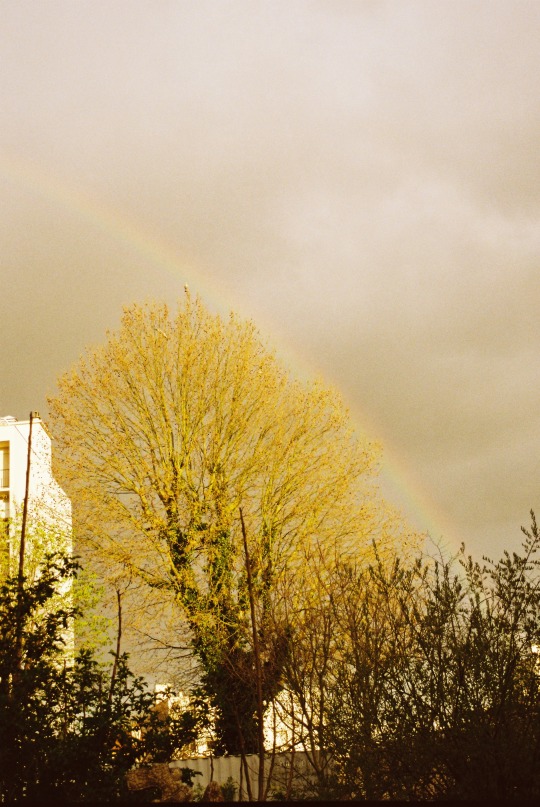
Prologue - Un temps tendu
''The atmosphere is quite heavy right now''; those were the first words my friend said to me, coming to pick me up from Nationale. Initially, I thought she was referring to her, as she recently moved in with her boyfriend, then she went on ''...you know, with the riots and everything''.
I left Paris on November 16th, the Monday right after the shootings. I had been living there for over 5 years. This was my longest trip back to the city after the recent tragedy. It's strange how the events have permanently changed the city; in a way, you can't think of Paris anymore without terrorism in mind, just like you can't picture New York City without 9/11 anymore.
I still recall the day right after the attacks - the panic and confusion that ensued. I was alone in my friend's studio and she told me that the people on the news advised everyone to stay indoors. I started to get claustrophobic towards the evening and decided to venture outside for some food. To my surprise, things seemed strikingly normal - people were chatting outside the cafes, taking the metro, going to the supermarket. Life went on.
Six months later, it felt like the city was back to its usual pace and the November 13th tragedy was some distant memory. Only, unlike the Charlie Hebdo shootings the previous year that after many weeks of seeing the support message Je suis Charlie in literally every newspaper, bar or Facebook page, things were still tense.
Place de la Republique remains the Gordian knot of an intricate conflict web that the authorities still can't seem to be able to contain. It's a big open space that could fill up quite quickly, located in the middle of several tiny streets. Republique has become that spot that illustrates the social clash between people who come to protest, skaters, and youngsters from the banlieue coming over from Bastille for a night out, yuppies from Le Marais, cops and homeless people.
I remember the Sunday after the attacks; I took the metro to Republique. As the train stopped, there were people running into the train scared and crying, shouting not to get out.
On a random night back in March, one of the exits was blocked and there were ambulances and police cars outside.
And now, the riots. When I first moved to Paris, back in September 2010, the friend who hosted me suggested I should go to a manif. She described it like this somewhat entertaining activity, where the streets get blocked and people march drinking, singing and chanting slogans. And, of course, a typically French custom, that would help me understand the culture better. At the time, they were protesting against the new retirement age. And yes, it did feel like a big street party.
But now riots have changed; there is tear gas and an alarming amount of police violence. I heard rumors about the things going on at Republique, how people started a sort of occupy movement and have taken over the place.
My festival-related trips didn't bring me near the area until this particular Sunday, April 9th, when I was stuck in the metro with the doors closed for about 15 minutes for a security clearance at Republique.
A big protest was scheduled that night, roads blocked, bus and traffic deviated. Having missed the last train, I got out on the square in search of a night bus, not really knowing what to expect. As I emerged from to the over ground, it felt like I was transported in a sort of Mad Max inspired reality, with slogans, street musicians, street vendors and even an urban garden improvised out of plastic bottles.
They have been protesting for days against the new labor law, which would erase some essential advantages of the Front Populaire and their radical reform in 1936, making the 40-hour work week no longer compulsory.
It was a tense time indeed.
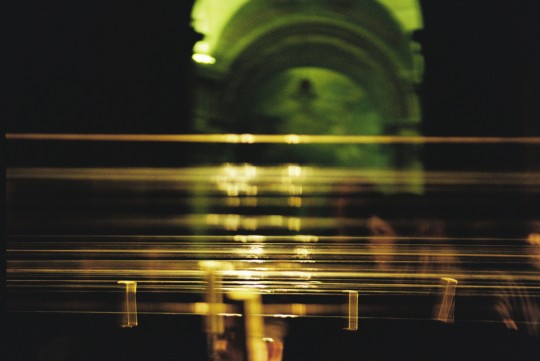
Instant Chavires' Day Out
For me, springtime in Paris was spread around the three major underground and experimental music festivals that accompanied the changing of the seasons: Presences électronique in March, Sonic Protest in April and Villette Sonique in May. Attending these events or simply looking at the line-ups and making plans were a yearly rite of passage, fully part of my daily life. It was just like a series of solstice rituals, which happened organically.
This year was the first time the festival was not just something in my life, but an event I built my calendar around. Going to Paris specifically for the festival operated a shift in my perspective, making the entire trip an event. Given the whole social context this year, the festival started to gain a series of new political connotations. Or, I was perhaps starting to decipher new metaphors within the music. Even the name, Sonic Protest, felt like a sort of slogan.
Within the so-called 'experimental spring' of Parisian festivals, Sonic Protest is probably the most dashingly diverse. Framed by Presences électronique, GRM 's showcase of electro acoustic, experimental and modern composition, and Vilette Sonique, on the more pop side of the underground spectrum, Sonic Protest is a very unique endeavor both in terms of programming and funding. The festival has been around for 13 years, with Arnaud Rivière and Francq de Quengo as programmers. For the connoisseurs, Arnaud Rivière is also the guy behind the cult venue Les Instants Chavirés in Montreuil, a DIY space for experimental music that has been around for over 20 years. Although Instants Chavirés is partially funded by the Mairie de Montreuil, Sonic Protest is mostly a self-financed affair.
The diverse programming at Les Instants (internationally, Cafe Oto in London and OCCII in Amsterdam could be considered kindred spirits) blending noise, ambient, free jazz, no wave, weird folk and experimental techno among its genres (last year Les Instants saw Black Zone Myth Chant, a High Wolf psychedelic side project and LIES artist Lowjack play the same bill, for example).
This sort of hunger for new and exciting music is at the core of the festival. However, unlike Les Instants, which can feel pretty packed if there are 100 people inside, Sonic Protest has the luxury of playing with bigger venues. It almost feels like Sonic Protest is Instants' field day - get out the big guns and let's have some fun!
The festival stretched out for two weeks this year, with the main series of 8 concerts in Paris, followed by events in other cities in France and Belgium. A sound art exhibition and a series of film screenings and conferences were also part of the program.
I could only attend 4 shows this year, but they were the most impressive, core events of this noisy shindig.
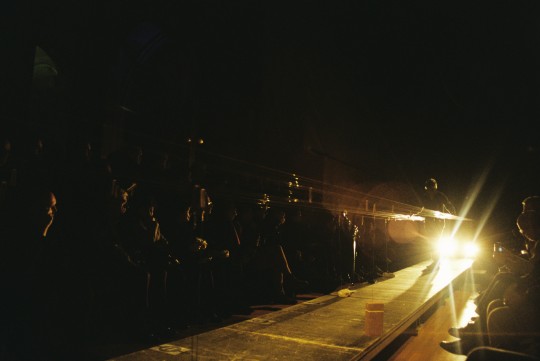
Modern Elegies
I arrived in Paris Wednesday morning, after a sleepless night and a 6 am flight to Beauvais Tille, also known as the bus stop airport. Porte Maillot, with its shuttles and cheap bus rides, brimming with immigrants and Asian backpackers was a much too painful déjà-vu. Only this time I wasn't headed to my 5th floor walk up with a terrace in Clichy, but to and a couple of nights on an air mattress in my friend's new apartment, still filled with moving boxes and lingering paint smell. Getting accustomed to the 10-degree temperature drop from Bucharest, all I could think about was sleep.
As I rushed towards the already familiar sight of L'Église Saint Merry, this catholic church by the Kandisnky fountain, right near IRCAM and Centre Pompidou, I was already back into my grumpy Paris self, cursing the crowds at Les Halles and sporting a permanent frown. Last time I was there back on a cold night in September, when John Butcher did a solo and Eliane Radigue presented one of her new acoustic, orchestra pieces.
There are three things you need to know about this church - it's extremely cold, the chairs are notoriously uncomfortable and the sound is always challenging because of its architecture. For the first time, I felt like Saint Merry found the perfect performance for the space in Ellen Fullman's Long String Instrument. I first saw a movie of this piece in a show at Le Plateau and I remember being greatly impressed by the physicality of the instrument.
Now, it was a question of scale - stepping into the empty space, with only a couple of people from the festival staff shuffling around preparing for the big night, the sight of this 30 meter long catwalk surrounded by strings that took over the entire nave was quite breathtaking. The entire installation was wrapped in traffic tape, an extra security measure for this robust yet delicate instrument. The resonating strings were held together by 15 large 35kg sand bags on each side.
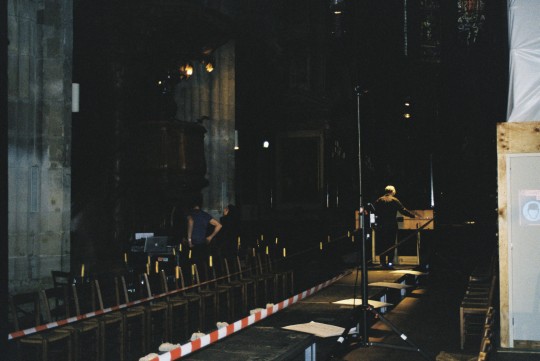
A fragile silhouette, not much taller than 1.60m, dressed in a nondescript black windbreaker and sneakers, was walking among the strings, making final adjustments. Composer Ellen Fullman was a particularly discreet presence, with her short white hair, tiny glasses and a gaze suggesting perpetual curiosity. Part of the wave of great minimalists, influenced by Alvin Lucier and Harry Partch, she is a lesser-known figure among the average contemporary classic music fan.
Just like Eliane Radigue in France, her incredibly innovative work has been marginalized until the last decade. This was to be her first performance in France and it was no surprise that Eliane Radigue, the other great lady of deep drones, was there to support her. The two together, chatting, made for an endearing sight and an important page in the history of modern music.
Later, at the communal table, I somehow ended up at the same end of the table as them; it was surprising how everyone from the staff was just going on about their dinner, while the two ladies were wrapped up in their own private bubble, sharing ideas about each other's work. The one thing that caught my ear was Ellen asking Eliane about her notation system, to which she replied that she didn't have one and had to explain to each performer how to play her pieces.
Returning to the church, I could see all the intricate series of numbers scattered across the wooden walkway, from sheets that looked like scores to numbers marked near the resonating wood boxes or the stones that were weighing down metallic clips onto the strings. I didn't know if I was looking at a Carl Andre/ Daniel Buren hybrid piece of sculpture or at a gigantic, gutted prepared piano.
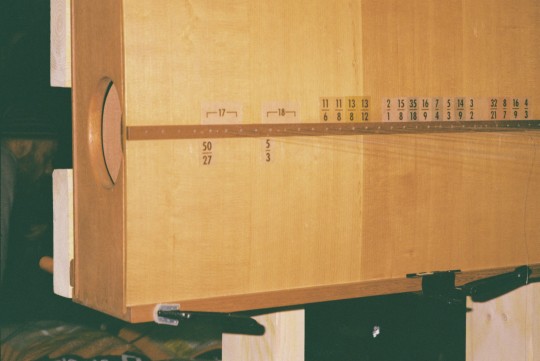
Soon, the spots behind the seats and those between the rows started to fill; some younger kids were even sitting on the freezing church floor in front of the chairs. We were gearing up for a sold out evening, which, given Saint Merry's capacity, meant around 600 people. Then, the large stage lights went on; the tape was cut. The audience was growing restless in anticipation.
Ellen took to the stage and started gently tapping on the strings at the left end. The beginning was very low and subtle, certainly not enough to drown her out. My angry glaring certainly didn't help. Then, something changed. The whispering stopped. Everything pretty much stopped, for that matter, as Ellen's piece was slowly growing bigger and more resonant. Even the photographer stopped taking photos, as if embarrassed by the sound of his camera disturbing the silence of the piece. It was as if the entire audience was swept by this large wave of emotion, drowning everything in its way.
The metallic drones grew deeper and deeper as Ellen was walking across the platform, as if in a trance, like a shaman trying to control the fire of her vision. It sure was a strong beast to tame, this grandiose, unusual instrument.
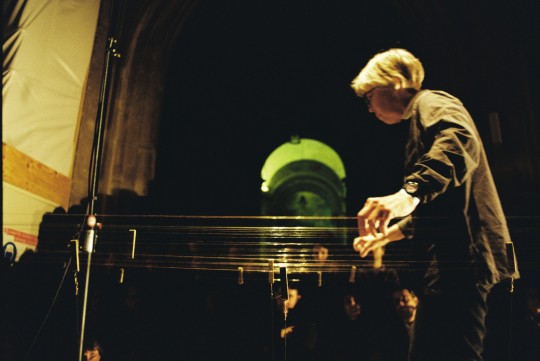
If in the first couple of minutes people were still holding out their phones, documenting this strange sight, they quickly started to let go and patiently listen to the slow progression of the music. I don't think I ever heard the church audience as quiet as that night. There was a sort of collective concentration, a group focus that felt almost electric. The drones started getting deeper and deeper, evoking dark visions that were slowly growing darker.
I didn't even dare look at Ellen, although her small but stern fingers kept moving across the strings, barely 20 cm away from me at times. She was looking down, carefully following her notes. The atmosphere started to get darker; you could sense the thick layer of emotions she conjured. Everyone around me was frozen, possessed.
About five seats down from me on the opposite row there was this blonde woman, ducking between the passageways left between the seats. She was on her knees, looking up at Ellen, fist clenched under her chin. Her eyes were wide and moist and mouth vaguely agape. The composer kept her slow pacing up and down the catwalk and this lady's stare was following her every move.
The next time I looked at her, I could see the black smudging of her eyeliner giving her a hazy look. As the piece progressed, I was more and more fascinated by this woman, whose mascara started dripping by now. It's as if she was expressing a sort of ancestral suffering awakened by the music, in a sort of Madonna pose bearing all of our pain. Maybe she has just recently broke up with her boyfriend or was going to some other very personal drama; either way, the music sure struck a chord with her and there she was, full-on crying for all of us dry of tears. It was such a touching portrayal of this large, sad, beautiful music. By the end of the first piece, I must have seen at least three people barely holding back their tears.
Then, the music stopped. It took about 45 seconds for the last chords to finish resonating before the church broke into a frenetic applause. It was a cathartic moment, as if a heavy lead blanket had been suddenly lifted. I believe that if she kept going for even a few more minutes, we might have all ended up weeping.
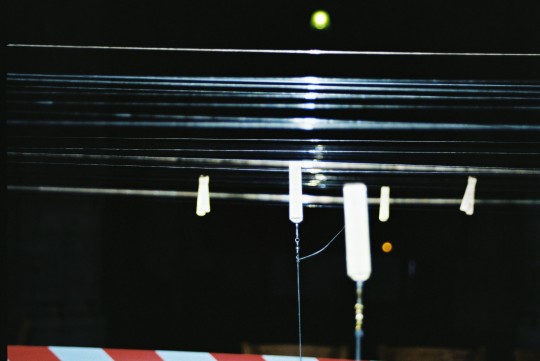
Visibility uncomfortable by the overly enthused round of applause, Ellen muttered a quick 'Thank you' and rushed to the middle of the walkway to turn on a motor for her next piece. This was a much shorter and lighter effort, the constant movement on the string giving it an almost jolly undertone. Again, an explosion of applause and ''Bravos!''s followed. I think the composer was slightly startled by this utterly warm welcome and slightly annoyed for having her set interrupted.
She then placed herself at the left end of the catwalk, where the resonating boxes and loose ends of the strings were. She started rapidly pulling on them, building up an alert pace of higher tonalities. At first it looked like some kitten playing with the extra string hanging from the knitting basket and we weren’t even sure if she was playing or simply started undoing the installation. This roughly 5 minute piece has the much needed playfulness after the first long meditation. It almost felt like a hopeful glimmer of light that would help us get out of the dark world she has previously ushered us into.
Things moved quite quickly after that – the staff started moving the chairs, uncovering the sand underbelly holding together the whole apparatus. The transition was probably a little too abrupt but they were already behind schedule and there was no time to lose.
I felt like even if that was the only thing I got to hear during the festival, I would go home happy. As I went outside for some air, I almost couldn't fathom coming back and listening to more music. Ellen's piece was just that overwhelming. Even if you didn't enjoy it, it still had quite the impact. The whole experience was quite humbling.
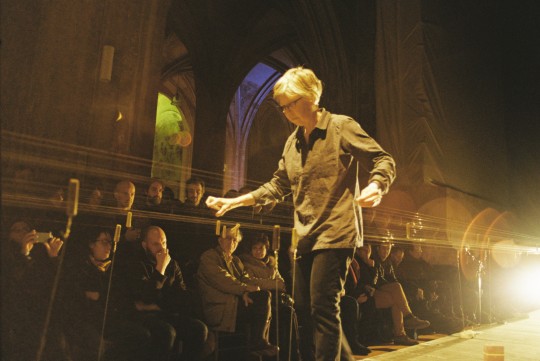
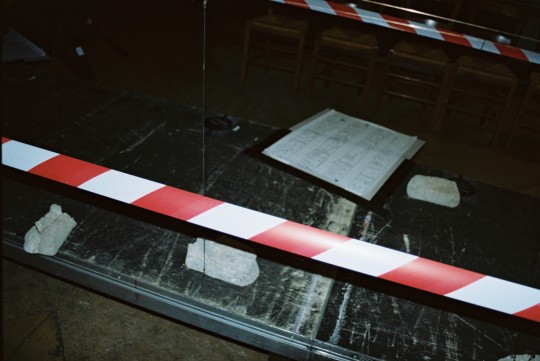
I heard the sound engineer talk to some other guy afterwards describing it as ''heavy''. At the same time, especially after that first taste of returning to Paris and all the turbulence that ensued, it felt like the most appropriate thing one could listen to in those messy times; something that played on our fears and pain, exposing it into the music. Ellen's elegy had strangely specific undertones in her universality.
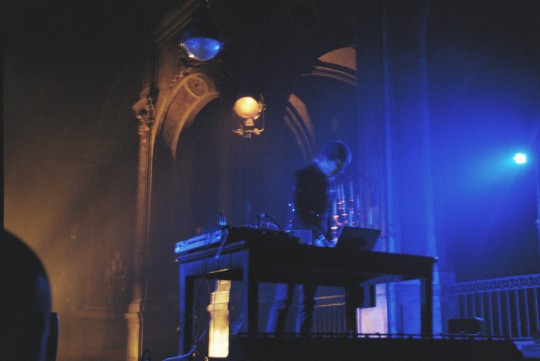
End of the nave
Going back inside, I arrived in the midst of the usual Saint Merry concert sight: people gathered around the bar side, talking quite loudly, a couple of curious spectators by the improvised record store booth and a few dozens of people standing, crowding in front of the altar stage. On stage, a guy in mid-thirties, with a small beard and fisherman's beanie was playing medieval-inspired laments on a violin drenched in electronics. He looked like the wandering bard you would read about in fairy tales. Yet his approach was somewhat oblique, wearing his pop and chanson heritage on his sleeve.
While most of the songs were slightly upbeat and even had dance potential, there was something utterly sad in the air. I knew my mind was still tangled up in Ellen's strings and for some reason couldn't commit to the young bard's tales. Even though they felt like songs from a dead king's banquet, there was a celebratory element that felt slightly inappropriate. Given another context, I would have probably been more inclined to delve into Sourdure's pagan folk. It was probably just my overall tiredness or the length of his set, but the evening was just a little too dense.
There was a moment when he paused, put down his violin and started addressing the audience; he told us that in medieval times, there was this custom of people from the village to go from house to house asking for food, while singing songs. Then he shared an acapella version of one of those songs. In the dimly lit church, I felt transported into a caravaggesque time where everything happened in dark little room by candlelight. It seemed like he conjured the entire magic of his set in this stripped-down 3-minute song.
Basinski's set took me by surprise. This was the moment we've all been waiting for: hearing the new piece by the tape drone master made for a highly anticipated set.

I managed to shimmy my way up front, to feel those loops right in my guts by the subwoofer. The feeling was quite intense, giving the enveloping effect I was hoping for. Only the cold marble of the church didn't make for a very comfortable listening spot. Some kids around me were sitting with their eyes closed, in a semi-conscious state, caught up in William's daydream.
As I rose from my nosebleed seat, the sound started quickly diminishing, losing most of its low-frequency intensity. Instead, you could hear this dark ambient music reflecting on the tall church walls. It seemed that the crowd around the stage grew even bigger. Some people pulled up chairs to the side and were listening patiently. The music felt like a soundtrack for all these strange audience members, elongating their necks trying to catch a glimpse of Basinski or standing on chairs in order to take a good photo. And he was just slowly moving into the blue light, wrapped up in his sequin jacket, sporting an absent smile. It reflected the light beautifully; for a moment I even thought his jacket was actually made out of LED lights.
I spent the end of his set towards the very end of the nave, hearing all the resonant frequencies break onto the walls. His piece had the classic beauty of his previous work, the same drawn-out elegant sadness, yet somehow I couldn't fully enjoy it. Maybe it was because all of the hype created; I'm sure I wasn't the only 20-something who came to the festival especially to see him.
They say it's not good to meet your mentors; in William's case, the live experience felt a bit underwhelming. Not that his music didn't make for a very touching experience, especially in the gorgeous space of Saint Merry, yet I felt like something was missing: his sadness was too overtly beautiful yet light, almost sporting a pop sheen. Maybe Basinski finally figured out how to emulate Eno's Music for Airports after all. Which was one of the things I loved about it in the first place – this baroque, aestheticized sense of suffering. However, it didn't hit me in the gut this time. Ellen's piece felt raw, almost brutal in comparison.
The audience scattered quickly as the show ended, either running for the last metro or hoping for William's reappearance for a selfie or an autograph. While the engineers were packing up his setup, one tiny silhouette was contemplating the space, empty once again.
It was Ellen Fullman, that somehow went unnoticed by the remaining groupies, still chasing after the glittered Basinski unicorn. I wanted to talk to her, but she seemed too deep in her own thoughts to be disturbed. This great tiny lady was surely brewing up another storm.
0 notes